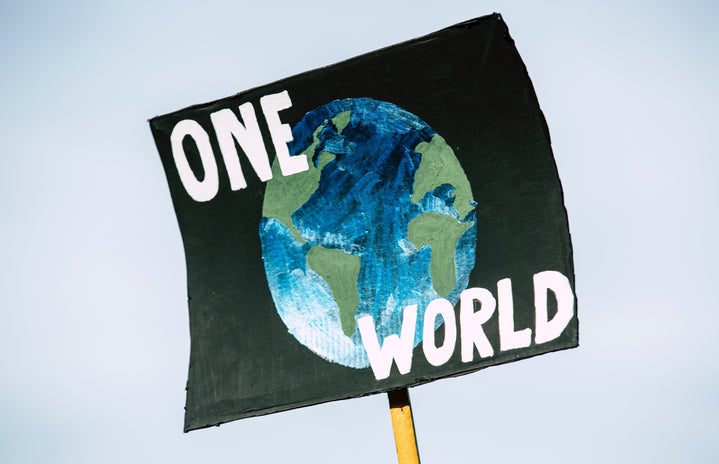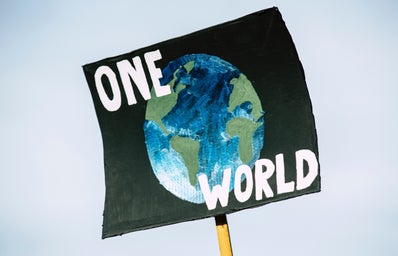We all know by now that plastic straws are a no-go, but simply tossing your plastic straws and replacing them with a reusable option will not cure all of the Earth’s climate’s problems. As Earth Day approaches, we all should take a second to analyze how we are all contributing to the global climate crisis by simply living our day-to-day lives. The best part is, if you are willing to, the changes you need to make in order to help repair our globe are so minuscule, they will not cause a burden in your day-to-day lives. However, it is in these small changes where we can see the largest amount of improvement in our carbon footprint. If everyone included these easy changes in their day-to-day, the Earth we live in would be a lot healthier. This is a common saying, but we truly only have one Earth and we need to make sure that generations to come will have access to all that the Earth has to offer like we do today. Below are some of the easiest sustainable practices to include in your life:
- Try to cook plant-based meals more often
-
You do not have to become a vegan to save the Earth! If everyone were to decrease their meat consumption, the impacts could be huge! Meat is one of the largest producers of carbon emission (especially beef) so decreasing our consumption can greatly decrease the lethal gasses emitted in the meat production system. There are so many amazing recipes that use lentils, tofu, chickpeas, or other plant-based sources of protein that will make you question why you ate meat every day in the first place. I highly recommend trying out any of these vegan dinner recipes from one of my favorite food bloggers!
- Take A Walk
-
Or ride a bike, carpool or take public transportation! But ditch a single-rider car as often as you can! Transportation vehicles make up 17% of all carbon emissions and cars make up 72% of those emissions! By simply walking somewhere or asking a friend for a ride if you are going to the same place, you can easily decrease you carbon footprint in a large way.
- Only Buy What You Can Eat
-
Not only is food waste a waste of money, but it is also a waste of resources, carbon emissions and farm labor. Limit your groceries to what you know you can eat before the food (especially produce) goes bad. You can always go back to the grocery store if you run out! In the past year, about 35% of all food produced was thrown away. That is an enormous waste of water, land, soil, carbon emissions and labor. Think about the bigger picture when stocking up on groceries.
- Use Beeswax Wrap Instead of Plastic Wrap
-
Beeswax is an eco-friendly and reusable version of plastic that works just as well! Think about all the plastic wraps you used in the past week. All of those are now just adding to our overfilled landfills or floating in the oceans. To make matters worse, plastic is not biodegradable, making it absolutely awful for our environment. Beeswax, on the other hand, is completely biodegradable, so when you can not reuse the wraps anymore, you can throw it away with less of an impact on the Earth.
- Switch To Bar Soap
-
Bar soaps have a much smaller impact on the environment than foam soap, mostly due to the process of creating bar soap versus foam soap. There is a much higher energy requirement to create foam soap and the plastic packaging that usually covers it. Foam soap requires 20 times the energy inputs of bar soap! In addition, foam soap does not last as long as bar soap (unless bought in bulk) and therefore must be replaced more often. Simply switching the type of soap you use is such a simple sustainable shift that can create big ripples.
- Eat Produce That Is In Season Only!
-
I know it is tempting to buy some delicious-looking strawberries in the winter to reminisce on warm summer days, but produce that is grown outside of its season is incredibly unsustainable. The energy and nutrient input that is required to grow to produce outside of its season is incredible and the product usually does not taste as good when it is not in season anyways!
- Use What You Already Have
-
This is the easiest and the most important sustainable proactive to incorporate into your daily life! We live in a huge material and consumer society, but every single thing that you purchase has gone through an extensive processing system that has released an enormous amount of carbon into the environment! If you do not need it, do not buy it! Not only will it be great for your bank account, but you will also be helping decrease carbon emissions. By reducing our consumer tendencies, less will be made and less carbon will be emitted into the atmosphere!
None of these changes require much effort at all. It truly is the small changes that we make in our lives that will create the largest difference. This Earth Day, and every day after that, make a small, sustainable change in your life and hopefully, we can begin to see the powerful effects of our small changes sometime soon. Let’s begin a ripple effect of sustainable practices.



